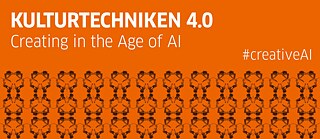“Kulturtechniken 4.0”
“The Artificial Intelligence failed miserably”

The project “Kulturtechniken 4.0” of the Goethe-Institut in Australia investigates the interplay between Artificial Intelligence and traditional cultural skills. In an interview, non-fiction author Thomas Ramge discusses whether technological progress is making us forget how to write.
By Barbara Gruber
How do you use Artificial Intelligence (AI) yourself in your everyday life and work?
Thomas Ramge: I use AI in my everyday life like most people: through my smartphone and many apps, whether it’s Google Maps, the search function, or via the recommendation algorithms when I shop online, which are all fed and operated by machine learning. Today almost every possible use of digital technology, is powered by machine learning or so-called AI, and has crept into all aspects of our lives.

I also tried in my latest book, with very prominent and competent support, to see if an AI could help to write a book that reflects on Artificial Intelligence, but the AI failed miserably. As human beings we can take that as a reassuring sign, at least I do.
Writing is a cultural practice that is essential for you as a journalist and author. How would you say is AI changing your own craft of writing?
Thomas Ramge: Perhaps less strongly than the question implies. When I write in German, my mother tongue, not that much changes. But of course AI impacts writing by making information more accessible. In the sense that there’s always a research process before every writing process. Especially if this research is fed online, there are AI mechanisms that draw my attention to information or texts or interesting links that I might have missed. It’s a help function to get information faster or more comprehensively. And I don’t feel that when I use this AI intelligently and systematically, it acts like a filter that withholds a lot from me or sends me into a filter bubble. Of course this can happen on social media, but for me as an author, I consider it a helpful tool. I’m able to navigate this world of incredibly diverse information much better with the help of the machine. But in the writing process itself, I don't see any direct influence from Artificial Intelligence or machine learning in my mother tongue.
Is it different when you write in foreign languages?
Thomas Ramge: When I write in French or English, AI is definitely a support, it augments intelligence and strengthens writing, because there I look closely at what the suggestions are and I have the competence to say: “Okay, that’s better now, or that’s not better”. But I might not have thought of it myself. I even notice that this system helps me to get better in the long term as I get fewer suggestions indicating that I am getting better and no longer need them.
AI can in that sense be a type of coach. In my book “Postdigital”, I give the example of a chess AI coach, who works on overcoming weaknesses when playing chess. I think this coaching function works very well, for example when learning maths, but also when writing, especially in foreign languages. At the same time, the question arises that if we never learn this cultural practice thoroughly, we may get to a stage where in primary schools the craft of writing is not learned properly anymore, and children rely on spell checks, grammar checks and the next step is, you vaguely know what you want to say, jot down a couple of words, AI suggests something and you only have to click on the suggestion. This leads to a world where the cultural practice of writing is no longer taught and learned properly. And where the AI in turn cannot act as a training device, and everyone stays stuck on a fairly low level.
So while AI is a useful tool for your own personal writing, you see real dangers for the future of the cultural practice of writing?
Thomas Ramge: Yes of course. We are the last generation, or maybe there will be one more after us, who grew up without strong AI writing assistants. But these AI assistants are here now, especially in English. In German the systems are following suit, even though they’re still much stronger in English. You get to a stage where someone who cannot write very well, can be pulled to a decent level of writing through machine assistance. And this raises important questions: Are we no longer learning the basics? In order to step up and really improve your writing, you will probably always need to be deeply proficient in the cultural practice of writing. But we need to ask, what proportion of low and medium level writers will be raised with the help from machines to a very decent level? And what repercussions does this have on teaching and learning, and the proficient use of language and writing? We shouldn’t neglect our writing skills, because we believe machines will get us there. Anyone who has children can clearly see the dangers autocorrect and autocomplete will have for the future of writing.